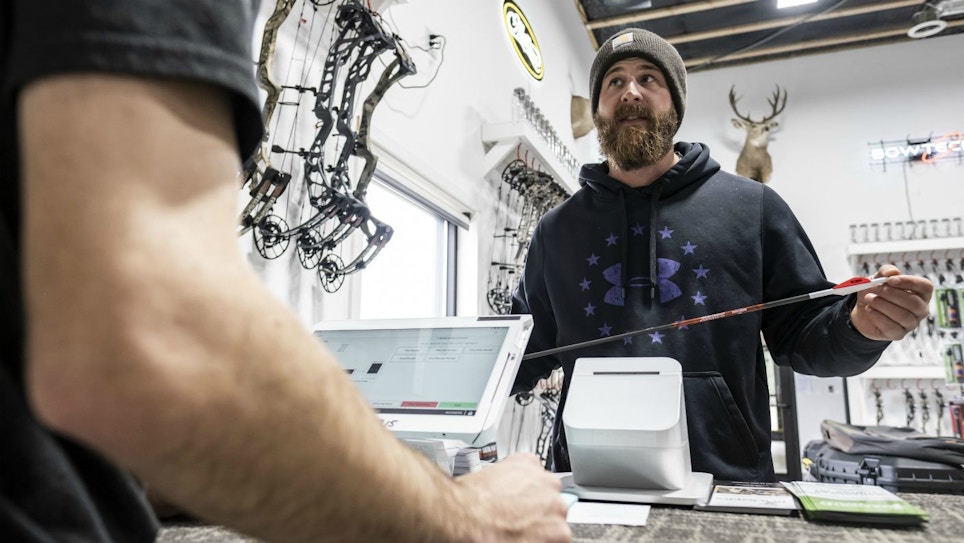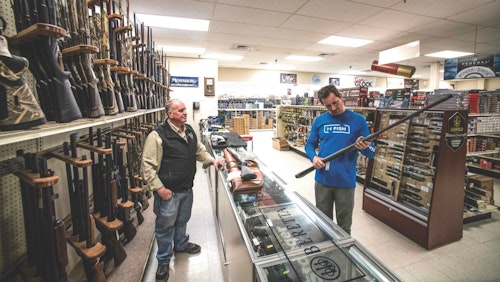One of the biggest surprises when I started in outdoor retail was encountering downright nasty customers. Most shocking was when such rudeness was sparked by innocuous interaction, such as asking if a customer needed assistance. It proved shocking enough that my initial response was to involuntarily laugh aloud — behavior that only further inflames bullies.
Here’s a real-world example (language sanitized considerably): “How are you doing today, sir?” I asked, eliciting only unintelligible grumbling.
“You look like you’re in a hurry, is there something I might help you locate today?”
Man spins, eyes shooting sparks of hate, “No! I have a flippin’ high-school diploma; I think I can find my own flippin’ stuff!” An involuntary laugh escapes me.
“You think that’s funny? Why is that funny?”
This is an extreme case mined from several years of observation, obviously. Yet there seems to be a certain element of society who believes store employees are fair game for abuse. I guess I already understood this, but it was startling to endure personally. I experienced customers chastising me personally over product pricing, cursing me because I wouldn’t throw in a free box of ammo with a rifle purchase, and yell at me for offering an alternative to something they had asked for, but we didn’t have in stock.
My parents raised me to treat everyone with respect, even forgetful waitresses, grumpy receptionists or surly sales associates. Friends or acquaintances that treat service employees like bad dogs in my presence will get an earful. I just won’t tolerate it — even in the face of complete incompetence. You have no idea what that person is currently dealing with.
In retail settings, the quicker you adopt this degree of empathy, the better. Some people are inherently miserable. Others may only be having an off day. It doesn’t matter. In any service industry, you suck it up, maintain a bright smile and do your darndest to either push through the uncomfortable circumstance or patiently turn it around with kindness.
I recall an employee I was forced to deal with often after being promoted to manager. This sales associate — let’s call him Travis — manned the gun counter. Like many gun-counter jockeys, Travis considered himself the absolute guru on anything and everything gun- and ammo-related. All too frequently, Travis was faced with customers (other self-proclaimed gun-counter experts) who called him out loudly for some bit of knowledge he had offered another customer, adamantly disagreed with a piece of advice offered, or even called him a liar after relating a particular rifle shot. Sparks would fly, bringing to mind a cartoonish “Dem’s fightin’ words!” meme.
Travis was no doubt guns-and-ammo savvy, generally a useful part of our sales force, but he eventually had to go. You just can’t have employees threatening to fist fight customers over inane disagreements, and Travis just couldn’t work past petty slights. Of course, this is another extreme example and another product of an inability to empathize — in this case with a customer’s need to feel important or superior. It simply doesn’t make you any less of a person to play along.
The gray areas generally arrive in the form of customers with semi- or fully legitimate gripes. This usually hinges on some form of equipment failure or return when a piece of gear underperforms or doesn’t live up to expectations.
Still, there is a fine line between “the customer is always right” and allowing your sales staff to be unjustly abused. Some customers can be dealt with logically, while others just don’t wish to be logical, as they may be trying to get away with something and their interaction is tainted by subconscious shame or guilt — or unmitigated, con-artist narcissism. Maintaining an even keel and not allowing yourself to be sucked into the anger and negativity is vitally important in retail.
Let’s take two examples from real-life experiences and examine how I handled them: Case one, customer buys tent, takes it camping over the weekend, it rains and tent leaks. Case two, customer buys tent, takes it camping over the weekend, brings it back Monday and claims it leaked (despite no rain in forecast).
Customer one is enraged because he had to endure a wet, cold night inside a leaking tent. Response: “Oh, no, I’m so, so sorry to hear that. That must have been terrible! Been there and done that, and nothing is worse. Are you okay? Hopefully the rain passed, and you were able to enjoy the remainder of your weekend?
“Here’s what I’m gonna do for you. I’ll upgrade this leaking tent — which I assure you was a fluke — with a higher-priced model at no additional charge (assuming price difference falls within retail markup and the store isn’t losing money). I’m so sorry you had to endure a cold, wet night, because — believe me — I know what that’s like. This upgrade tent should guarantee that never happens again.”
Customer two is shamelessly taking advantage of our store’s guaranteed return policy, after using the tent free for the weekend. Response: “Okay, why are we returning this tent?” clipboard and pen theatrically in hand.
“Do you need a reason? Store policy says there are no questions asked.”
“I have to give our customer service people a reason for the return.”
“Okay, tell them it leaked.” The tent is bone dry.
“Do you want a replacement or cash back?” End of conversation. Everyone leaves happy. Slightly used tent is re-boxed and placed in bargain bin 10 percent above wholesale price.
The real key to defusing bad situations is refusing to take things personally and showing real empathy. Customers with legitimate grievances just want to vent a little and be understood. The con artist thinks he is smarter than you, but so what? Play along for fun. They haven’t kicked your dog or threatened your children.
Don’t be like Travis. Let it roll off your back. You have bigger matters to attend to and turning things around with a disgruntled customer and sending them out the door happy leaves more time for the important things in retail — like attending to pet customers who invariably make your day brighter.








